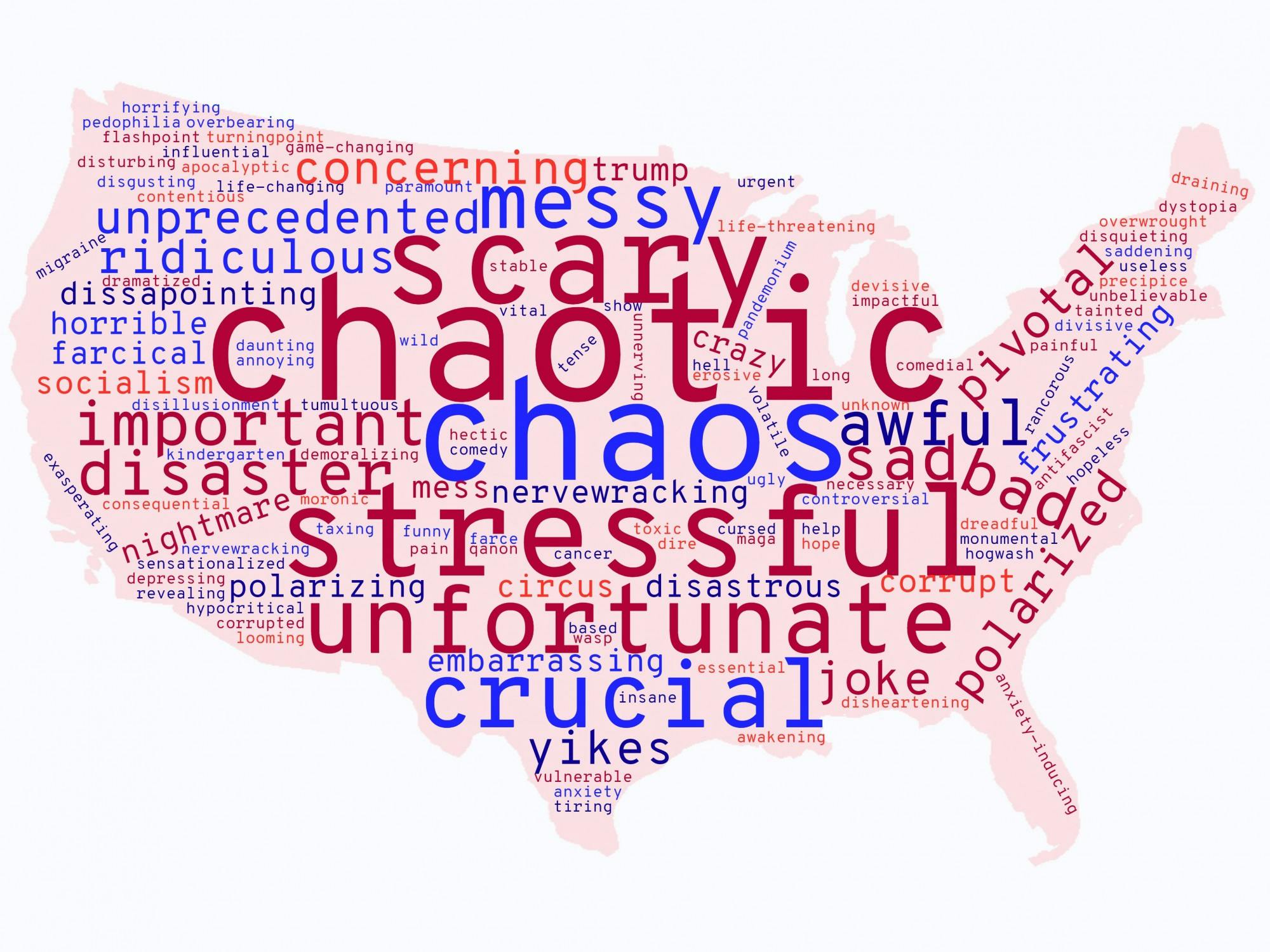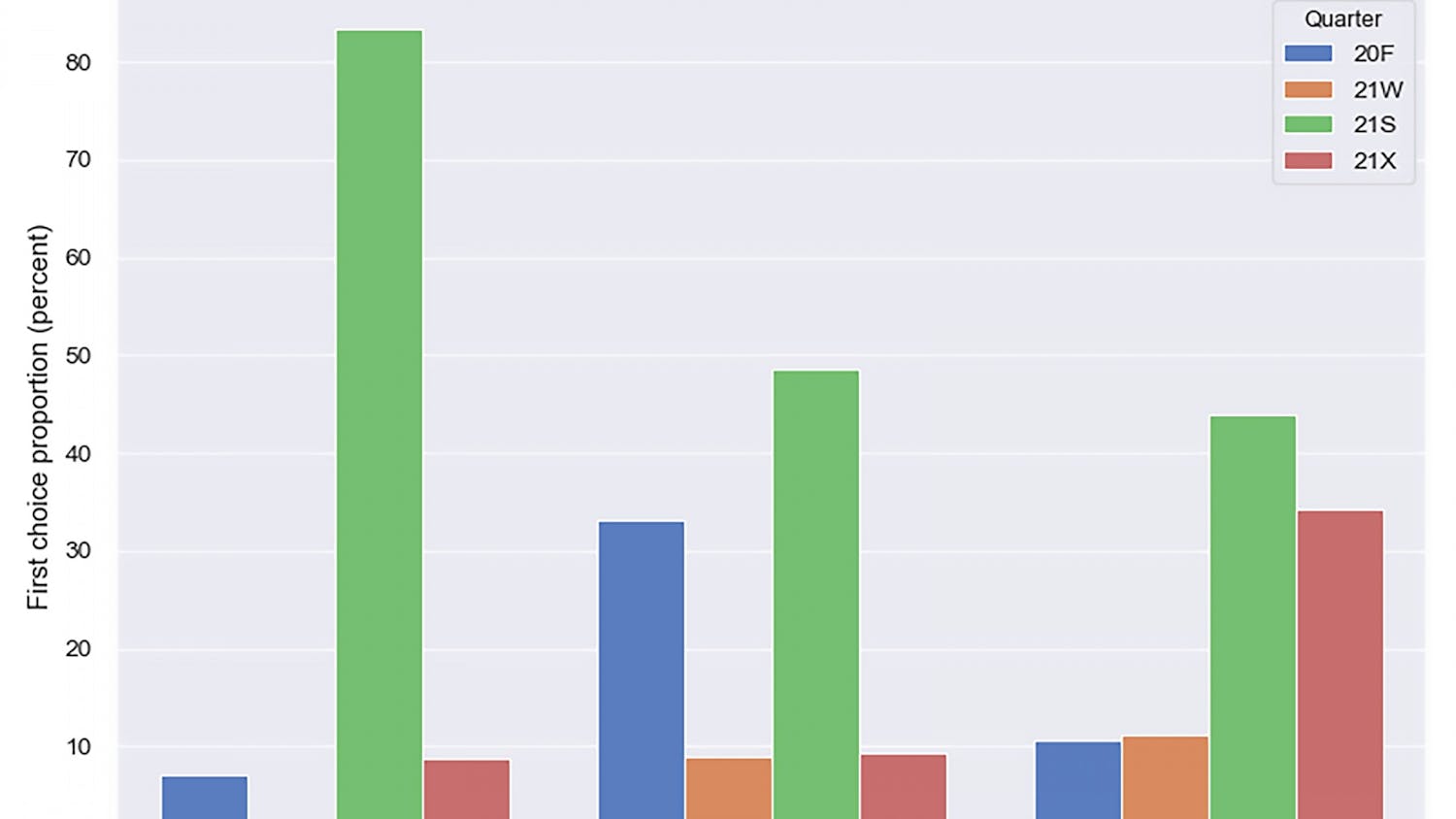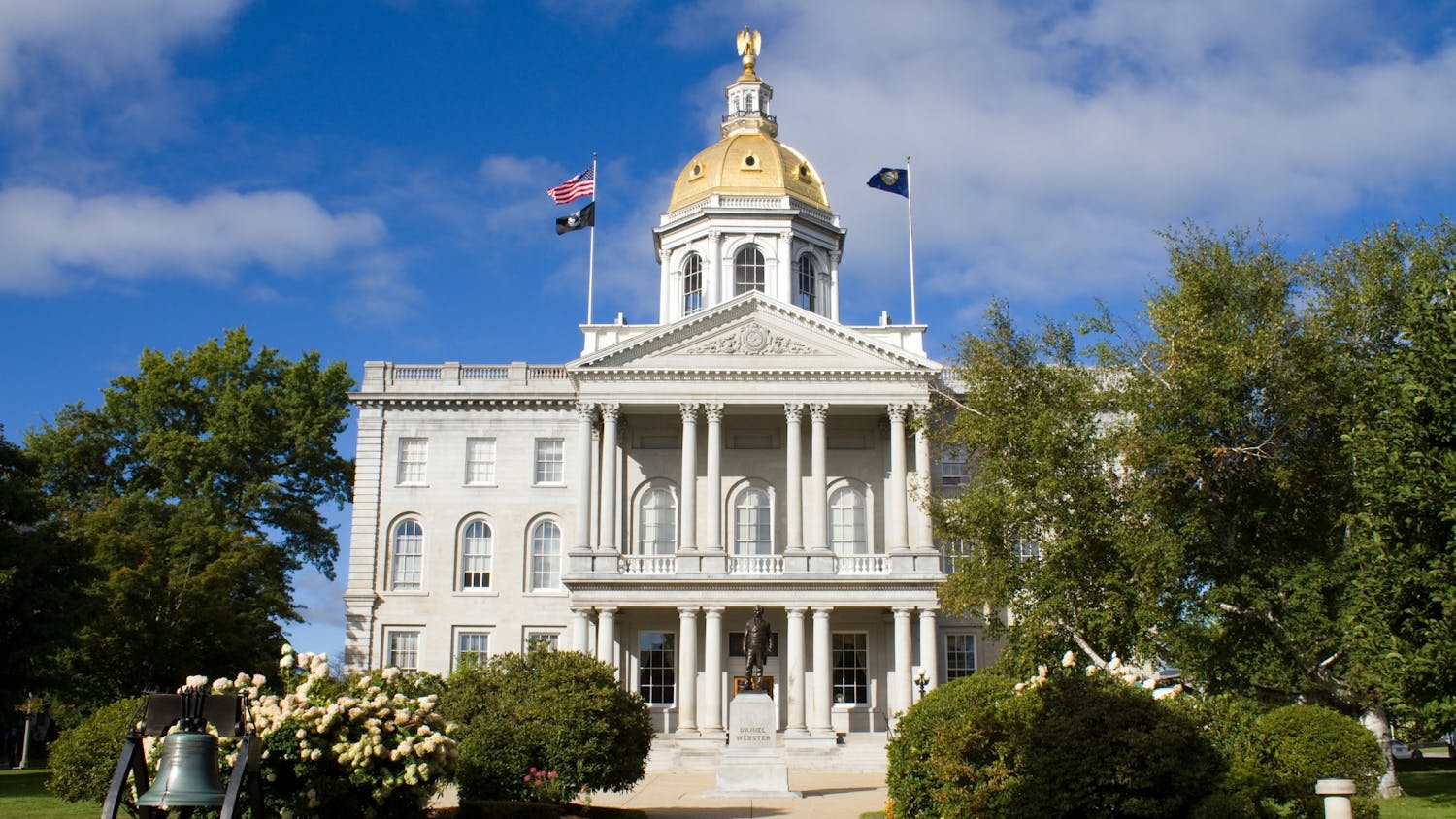With the 2020 election underway, The Dartmouth polled students on their views on the upcoming election and key political issues. Below is a summary of the main results.
Students overwhelmingly support Biden, despite dissatisfaction with both candidates
The race between the former Vice President Joe Biden and the President Donald Trump has become one of the most divisive and unusual elections in recent memory. Among Dartmouth students, Biden was the overwhelming favorite: 82% of students plan to vote for him, while 13% plan to vote for Trump — out of a sample in which 61% of students identified as Democrats, 10% identified as Republicans and 26% identified as independents.
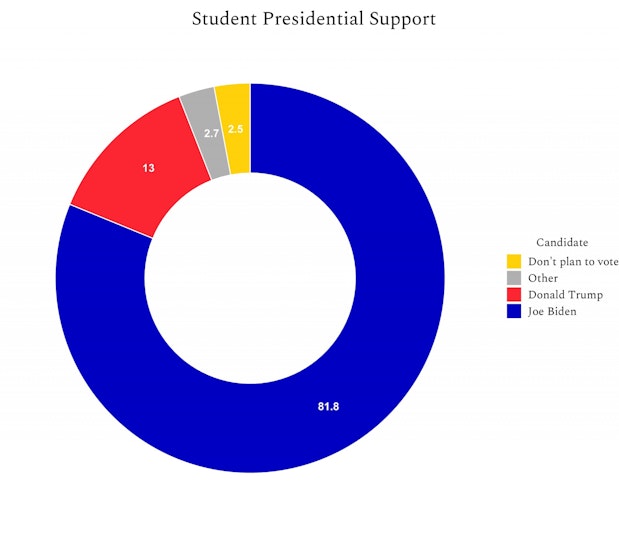
Students generally planned to vote along their respective party lines. Of students that identify with the Democratic party, 98% plan to vote for Biden, while 85% of Republican-identifying students plan to vote for Trump. Independent voters leaned heavily toward Biden, with 80% planning to vote for the former vice president.
Furthermore, students’ support for their preferred candidates seems unwavering. When asked if they could still be persuaded to support another candidate, 95% responded that they are very or somewhat unlikely to change their preference.
Students were also asked about their satisfaction with both major party candidates. While the majority of students support Biden, not all are satisfied with his candidacy. Though 82% of students plan to vote for Biden, just 51% of the total student body polled replied that they are satisfied with Biden as the Democratic nominee. Of those somewhat unsatisfied with his nomination, an overwhelming 95% said they will still vote for him, and of those very unsatisfied with his nomination, 37% still plan to vote for Biden. A greater majority of students are dissatisfied with Trump’s nomination, with 88% of students unsatisfied and only 9% satisfied with Trump’s candidacy. Unlike with Biden, only 45% of those somewhat unsatisfied with Trump’s nomination still plan to support his reelection. Just 2% of those very unsatisfied with Trump’s nomination plan to support him.
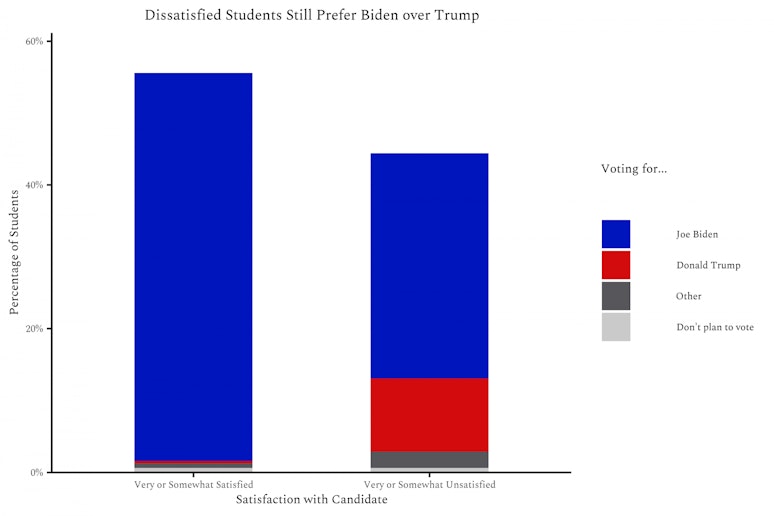
The 2020 election season featured two presidential debates and one vice presidential debate. When asked who won the first debate, 64% of students deemed Biden the winner, 8% chose Trump, 13% said the debate was a tie and 15% had no opinion. In the second debate, Trump seems to have fared better. Just 49% of students said Biden won the second debate; 17% said Trump was the winner, 10% thought the debate was a tie and 24% had no opinion. For the vice presidential debate between Sen. Kamala Harris, D-Calif., and Vice President Mike Pence, 56% of students selected Harris as the winner of the debate, while 18% chose Pence.
Regardless, these debates seemed to have little effect among students’ voting preference. When asked if any of the debates influenced their votes, 91% of students said that the debates had no influence, while just 9% said the debates influenced their votes.
Dartmouth students are highly engaged in the 2020 election, with 80% of students agreeing that the election is a common topic of conversation among their friends. However, the election seems to be a more prevalent topic of conversation among Democrats, 85% of whom said the election came up frequently in conversation, than among Republicans (69%) or independents (74%).
Students are split on whether they think Trump will win reelection, with 32% of students saying that Trump is either very or somewhat likely to be reelected, while 38% of students feel he is very or somewhat unlikely to win. Republicans are far more likely to be optimistic about the president's chances of reelection, with 57% saying he is likely to win, while just 27% of Democrats feel the same. Independents give a slight edge to Trump winning reelection, with 37% believing he is at least somewhat likely to win, against 31% who believe he is likely to lose.
Students were also asked about their voter registration status. A total of 96% of students are registered to vote in the election, either in New Hampshire (52%) or in another state (44%). Of students voting outside of New Hampshire, students are most commonly registered to vote in California (16%), Florida (11%), Pennsylvania (8%), Virginia (8%) and New York (7%).
Students disapprove of Trump’s performance on most issues, views mixed on economy
Students were asked to indicate their approval of Trump’s performance in a variety of categories. When asked if they generally approve or disapprove of the job Trump has done, 87% disapproved, while 13% approved. No students selected the option “no opinion.” Respondents’ approval ratings also align heavily with students’ political party: 99% of Democratic-identifying students disapprove of Trump’s performance as president, while 82% of Republican-identifying students approve of his presidency. Trump is unpopular among independents: 86% of independent-identifying students disapprove, while just 14% of independent-identifying students approve of the president’s performance.
While students generally disapprove of Trump’s overall job performance, levels of approval vary across issues. Students were asked about Trump’s performance on six issues: climate change and the environment, health care, COVID-19, racial justice, the economy and foreign policy. Trump’s handling of the economy received the highest approval, with 41% of students saying that they were very unsatisfied. Students were most unsatisfied with Trump’s handling of climate change and the environment, with 81% of respondents saying they were very unsatisfied. Students also expressed dissatisfaction with Trump’s handling of COVID-19 and racial justice, with 80% and 79% saying they were very unsatisfied, respectively. Trump’s handling of health care and foreign policy fared slightly better, with 69% very unsatisfied with his handling of health care, and only 61% very unsatisfied with his handling of foreign policy.
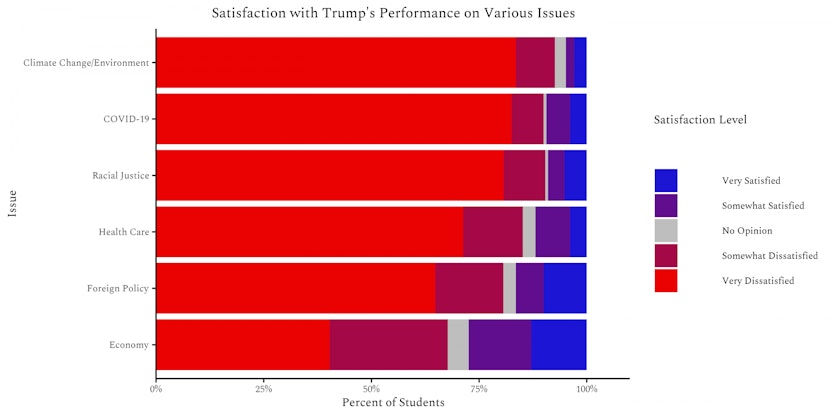
Beyond Trump’s performance, students were asked about the country’s trajectory in general. 88% of students believe that the country is on the wrong track, while 12% believe the country is on the right track. Democratic-identifying students are far more critical; 98% of Democrats stated that the country was on the wrong track, while 71% of Republicans believe that the country is on the right track. Independents also seem to be critical, with 89% believing that the country is moving in the wrong direction.
Students oppose Justice Amy Coney Barrett’s confirmation, remain divided on court expansion
With the recent death of Justice Ruth Bader Ginsburg, the Supreme Court has become a hotly debated issue, gaining even more prominence with the rapid confirmation along partisan lines of Justice Amy Coney Barrett. Dartmouth students generally disapprove of Barrett’s confirmation before the election, with 75% of the student body disapproving of her confirmation while just 19% approve. There are stark partisan differences, with 92% of Republicans approving of the confirmation while the same percentage of Democrats are opposed. Meanwhile, 67% of independents disapprove of the confirmation while just 27% approve.

Some Democrats and progressives have suggested expanding the Supreme Court in order to counterbalance the current conservative majority, with Biden committing to creating a commission exploring potential Supreme Court reform should he be elected. Dartmouth students are more evenly divided on the issue of court expansion than they are on Barrett’s confirmation, with 44% in favor while 45% of students oppose such reforms. Among Democrats, the issue is more divisive, with 59% of Democrats in favor while 32% oppose, while Republicans are almost uniformly against the idea, with 93% against. Independents too seem against the idea with 56% opposed and just 29% in favor.
Majority of students plan on voting absentee, not all confident in the integrity of election
The COVID-19 pandemic has resulted in a completely new voting environment, with a surge in absentee voting and sharp declines in in-person voting. The majority of Dartmouth students (59%) have voted or plan to vote absentee, while 16% say they will participate in early voting and just 21% plan to vote in person on Election Day.
With the rise in popularity of alternative forms of voting, Trump has claimed without evidence that absentee ballots, which are generally expected to favor Biden, may be liable to fraud. While most Dartmouth students seem to be confident in the integrity of the election, with 58% of students indicating they are very or somewhat confident, a notable minority of 25% are somewhat or very unconfident. A strong majority of students, 73%, are confident in the integrity of mail-in voting, with only 20% of students very or somewhat unconfident. Correspondingly, 85% of students are somewhat or very confident that their vote will be counted in the election. Voters who plan on voting in person on Election Day are significantly more likely (70%) to be confident that their votes will be counted than voters who plan on voting by mail, of whom only 43% described themselves as very confident, with another 39% saying they were somewhat confident.
Students rate climate change, COVID-19 pandemic among top issues
As part of the survey students were asked to rank the top three issues they considered most important. Going into the election, climate change and the environment ranks as Dartmouth students’ top issue, with 56% of students placing it in their top three issues. Following closely are the COVID-19 pandemic with 45% and racial justice at 44%. All three are issues that have become increasingly prominent in the last six months, though not in a bipartisan way. There exists a significant partisan gap in importance placed on the above issues: all three are far more important to Democrat-identifying students (68% chose climate change, 51% chose COVID-19 and 52% chose racial justice) and independents (51%, 49% and 42%, respectively) than Republican-identifying students (5%, 12% and 4%).
Other issues such as health care, the economy and immigration also rank highly, at 26%, 26% and 15% of students, respectively. On the other hand, students consider issues such as the federal budget deficit, voting rights, national security and drug policy relatively unimportant, with each ranking among the top three issues of 5% or less of the student body.
Methodology Notes:
From Oct. 24 to Nov. 1, The Dartmouth fielded an online survey of the Dartmouth student body on their view of the 2020 presidential election. The survey was sent out to 4,642 undergraduates through their school email addresses. 415 responses were recorded, resulting in a 8.9% response rate. Using administrative data from the College’s Office of Institutional Research, responses were weighted by gender, class year, and race/ethnicity. Weighting was done through iterative post-stratification (raking). Survey results have a margin of error +/- 4.6%.
William Chen and Aaron Lee contributed reporting.

